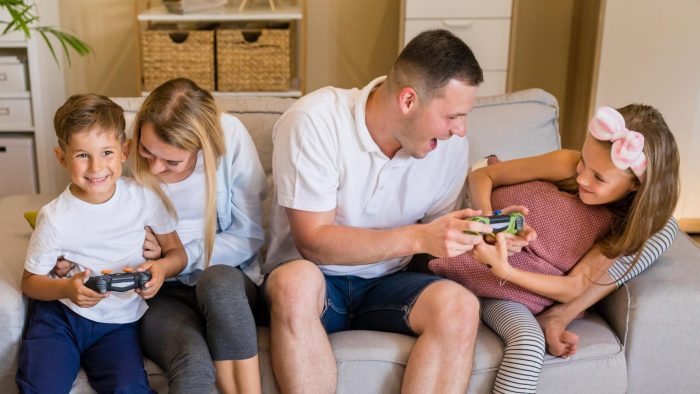Last Updated on September 23, 2025 by admin
Video games aren’t going anywhere, and for many families, that’s not a bad thing. When approached with intention and care, gaming can support connection, creativity, and even lifelong skill development. But left unchecked, it can also disrupt routines, create tension, and isolate kids from the people who care most about them. The goal shouldn’t be to eliminate games; ideally, it should be to design an environment where they’re part of a balanced life. Here’s how families can shape gaming into a net positive, without pretending the risks don’t exist.
Start With the Right Games in the First Place
Not every game is made with kids in mind, and assuming otherwise leads to trouble. Just because a game is popular doesn’t mean it’s appropriate. Families that pay attention to ratings and context, not just titles, set themselves up for fewer headaches later. More importantly, talking about why certain games aren’t a good fit can help kids make smarter choices independently. It’s not about fear. It’s about understanding that selecting age‑appropriate content matters, especially when games involve online interaction, user-generated material, or rapid-fire visual stimulation. Establishing that expectation early makes room for more productive conversations later.
Draw Clear Lines Around Time and Timing
It’s easy to say “limit screen time,” but that advice is useless without specifics. Different ages handle stimulation and self-regulation differently. For younger kids, structure matters more than autonomy. That means parents may need to enforce consistent routines — including off days — while older kids might respond better to negotiated boundaries they help create. Either way, the key is consistency. Research supports limiting daily game hours by age, not just to free up time for other activities, but to preserve attention spans and sleep quality. When games happen matters just as much as how long they last. Save intense sessions for times that won’t disrupt meals, homework, or wind-down.
Use Controls — But Explain Why They Exist
Parental controls shouldn’t be seen as digital babysitters. They’re training wheels for autonomy. Used well, they can filter inappropriate content, cap playtime, restrict spending, and monitor communication. But if they’re dropped in without context, they breed mistrust. Kids are more likely to respect limitations when they understand the purpose behind them. Most consoles and devices make using built‑in parental control options relatively easy, it’s the human part that’s harder. Take time to walk through the settings together. Frame it as a joint effort, not a surveillance plan. This approach normalizes healthy boundaries and teaches kids how to manage them themselves later on.
Make Movement Part of the Routine
Gaming doesn’t have to be the enemy of physical activity, but it will be if parents don’t intervene. When energy gets parked in front of a screen for hours, the rest of the body misses out. The solution isn’t to demonize games, but to connect them to the rest of a healthy routine. Set clear limits, then suggest what comes next. Go outside. Move around. Do something that raises your heart rate. This works best when it’s embedded in the family rhythm, not pitched as punishment. Balancing screen time with active movement builds a natural rhythm that protects against overload and keeps bodies in motion, especially during long weekends or school breaks.
Don’t Just Watch — Play and Talk
There’s a huge difference between monitoring screen time and joining it. When parents engage directly, even occasionally, with what their kids are playing, it changes the whole tone of the relationship. Instead of “you don’t get it,” kids start seeing parents as participants. And that opens the door to bigger conversations. What’s the goal of this game? What parts are stressful? What’s the story trying to say? You don’t need to love every game they play. But playing video games together strengthens bonds, builds trust, and gives you the context to intervene if something shifts. It’s much harder to recognize red flags from a distance.
Video Games Can Foster Lifelong Skills
It’s easy to focus on the negatives, such as isolation, distraction, and poor sleep, but gaming can also be a space where kids build tools they’ll carry for life. Certain games push players to solve open-ended problems, coordinate with teammates, or adapt quickly to unpredictable scenarios. These aren’t just distractions, they’re practice arenas. When the right games are chosen and played in a balanced environment, they can play a real role in developing lifelong cognitive skills. Rather than treating video games as mindless, families can reframe them as one of many platforms for growth, when the balance is right.
Stay Attuned to the Emotional Layer
Beyond mechanics and screen time, there’s an emotional component to gaming that families shouldn’t ignore. Games can be stress relievers, confidence boosters, and even social bridges, but they can also become escapist habits or spaces where negativity builds. That’s why emotional check-ins matter just as much as rule-setting. The best time to talk about this isn’t when there’s a problem, but when things are calm. Ask questions without judgment. Stay curious. Discussing mental health and gaming impact is a powerful way to support kids through the highs and lows of their digital lives. When conversations are open and ongoing, games lose their power to isolate.Creating a healthy family relationship with gaming doesn’t require perfection, it requires presence. You don’t have to understand every title or master every mechanic. You just have to care enough to stay involved. That means choosing games intentionally, setting clear expectations, using tools wisely, encouraging physical breaks, participating together, and keeping the emotional door open. When families treat gaming as something to navigate together — not something to fear — the outcome is more confidence, better communication, and less conflict. And that’s a win for everyone on the screen and off.
Level up your gaming skills with the latest tips and tricks from Game Apex Legends, your ultimate destination for mastering the most popular games and connecting with a vibrant community of fellow gamers!






